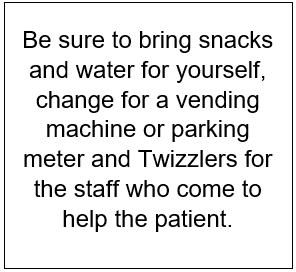Help for the Patient Safety Advocate
Learn About Our Upcoming Educational Programs
Join the Pulse Patient Safety Advocate Academy - Always Growing and Here to Support You!
WE HELP YOU BE THE ADVOCATE OR SUPPORT PERSON FOR THE PEOPLE YOU CARE ABOUT
Pulse Center for Patient Safety Education & Advocacy will never ask a patient or family to sign a HIPAA form or to consent to release of private information because no conversation takes place without the patient or chosen support person present.
Learn more about HIPAA
GOING TO THE HOSPITAL
This information will help you prepare items to take when visiting the patient.
The Visitors Sign In invites visitors to leave a message.
The Story Board. Fill in with the patient and hang on the wall so people visiting and staff can know more about the patient.
The Patient Assistant List
Prepare for the Hospital Visit
TOOLS FOR THE PATIENT SAFETY ADVOCATE
Patient Advocate Check List
The Patient Advocate Checklist helps explain the role of the advocate and the needs of the patient. This information is from the book Family Centered Patient Advocacy which was written in collaboration with some of the finest leaders in patient safety.
A one page guide to understanding advance directives
Medical Orders for Life-Sustaining Treatments MOLST
The Medical Orders for Life-Sustaining Treatment (MOLST) form
US Advance Care Planning Registry (formerly the National Advance Directory Registry)
Website to help understand advance directives
Healthcare Proxy
Print and complete with someone you trust. A healthcare proxy is not the same as an advocate. A healthcare proxy can speak for the patient when the patient can't speak for themselves. An advocate is a helper.
The explains how a person starting off as a patient advocate (or in a position to assist a family of a hospitalized patient when the family members can’t be available) can get started.
Quick Guide for the Support Person
You have been asked to help a friend or family member. You aren't sure what to do, and don't have time to prepare. Here is a quick guide to patient safety.
Personal Medical Diary(Medical History)
Medical history and doctor's names, medication and procedures. Print as many as you want and put them in a folder or binder.
The Designated Medication Manager (DMM)
Support someone when getting a new medication or have someone support you and be your DMM.
STARS (Help communicating your symptoms)
When seeing your clinician be as accurate as possible when describing your symptoms, and think STARS.
Planning for Surgery Some helpful questions to ask when you are planning surgery or a procedure
WORKING WITH VULNERABLE POPULATIONS
To learn how to interface better with specific or vulnerable populations who are often faced with unconscious bias. For additional resources, go to our Healthcare Equality Project website.
LEARN WHO IS AT RISK
We hope that this will be a place to easily find studies and information about patient safety and studies about medical errors while remembering that each number represents someone who entrusted their life or the life of a loved one to the healthcare system. One is a Number
Tips for the Advocate When Talking to the Doctor (Or other clinician)
At Discharge

STILL NEED HELP?
Call us to discuss (516) 579-4711
or look for a Professional Patient Advocate
ADVOCONNECTION
Offers access to independent, professional health / patient advocates and care managers to help you navigate the difficult and sometimes treacherous waters of the health care systems in the United States and Canada.
Greater National Advocates
Our trusted online portal allows patients and their loved ones to quickly connect with a knowledgeable independent Patient Advocate who has experience dealing with hospitals, insurance companies, doctors and long term care facilities. Our goal is to help patients and loved ones cut through the red tape and find peace of mind.
HealthAdvocateX
HealthAdvocateX is a national organization committed to helping youtransforminto an active participant in your care. We are committed to helping everyone understand what health advocacy is, how to boost health advocacy skills and knowledge regardless of who you are. While we do not provide direct health advocacy services, we can connect you with people who do. We specialize in inspiring people to take action through community education, health advocacy events and by connecting you to trusted health advocacy resources.
HELPFUL WEBSITES for patients, families & advocates
ConsumerMedSafety.org is brought to you by the Institute for Safe Medication Practices (ISMP)—the nation's only nonprofit organization of pharmacists, nurses, and doctors devoted entirely to safe medication practices. Preventing medication errors is no longer just a responsibility for health professionals—consumers like you can also play a vital role.
Drug Interactions Checker A drug interaction occurs when the effect of a particular drug is altered when it is taken with another drug, or with food. The Drug Interactions Checker explains the mechanism of each drug interaction, the level of significance of the interaction (major, moderate or minor), and in certain cases, can provide the recommended course of action to manage the interaction. The Drug Interactions Checker will also display any interaction between your chosen drug(s) and food.
U.S. Health and Human Services
Compare information
We rate the websites that help you find the right doctor, hospital, and nursing homes and we provide tips about quality concerns.
The Institute for Safe Medication Practices (ISMP), is the nation’s only 501c (3) nonprofit organization devoted entirely to medication error prevention and safe medication use.
An independent, not-for-profit organization, The Joint Commission accredits and certifies more than 18,000 health care organizations and programs in the United States. Joint Commission accreditation and certification is recognized nationwide as a symbol of quality that reflects an organization’s commitment to meeting certain performance standards.
The National Family Caregivers Association educates, supports, empowers and speaks up for the more than 65 million Americans who care for loved ones with a chronic illness or disability or the frailties of old age.
NeedyMeds is a national non-profit organization that maintains a website of free information on programs that help people who can't afford medications and healthcare costs.

Helpful NY LINKS
Pulse CPSEA does not guarantee the accuracy or information of these websites but all sites listed have come highly recommended or are sites we use.
IF YOU HAVE A CONCERN ABOUT QUALITY OF CARE IN NY
If You Have a Concern About Quality in a NY Hospital
If You Have a Concern About Quality in a NY Nursing Home
If You Have a Concern About Quality in a NY Doctor's Office
Adult Care and Assisted Living Complaints 1-866-893-6772
Home Care and Hospice Complaints 1-800-628-5972
Hospital Patient Care Complaints 1-800-804-5447
Hospital and Diagnostic and Treatment Center Complaints 1-800-804-5447
Laboratory Complaints- 1-800-682-6056
Medicaid Fraud Hotline 1-877-87FRAUD
Managed Care Complaints 1-800-206-8125
Nursing Home Patient Care Complaints- 1-888-201-4563
Professional Medical Conduct Complaints 1-800-663-6114
The Joint Commission 1-800 994-6610

NY WEBSITES
Long Island 2-1-1
The mission of 2-1-1 Long Island is to provide all Long Islanders a comprehensive internet connection to human services on a day-to-day basis and in time of disaster.
NY Foundation for Senior Citizens
Respite Care Program
NY Ombudsman
The heart of the Long Term Care Ombudsmen Program is the team of certified Ombudsmen who are empowered to resolve issues surrounding the care and quality of life for people living in nursing homes and adult care facilities. Ombudsmen are there to represent the residents' interests. It is the residents' desires and needs that are considered and acted upon.
NY State Hospital Profile
Use this site to find information about hospitals in New York State, and the quality of care they provide.
NY State Physician Profiles
Here you will find information on all licensed doctors of medicine and doctors of osteopathy registered to practice in New York State. Information is self-reported by the physician
NEWS, FACTS AND STUDIES
One is a Number
Visit our sister site 'one is a number' for regularly updated links to studies and information about patient safety and studies about medical errors.
PAYMENTS AND DONATIONS
Credit card payments for any of our Pulse Center for Patient Safety Education & Advocacy (formerly PULSE of NY) programs, services or events can be made by clicking the 'Donate' link below.
Show Someone You Care with a Special Card While Also Supporting Pulse Center for Patient Safety Education & Advocacy See the Cards Here
All payments and donations to Pulse Center for Patient Safety Education & Advocacy (Pulse CPSEA) can be made through this secured site. We thank you for your support.
Please use the 'Donate' link below for any credit card donations or payments for any of our programs, services or events.



